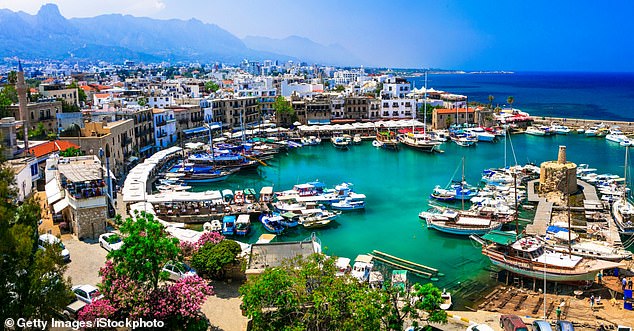When you finally put your feet up in retirement, you want to make the very most of your hard-earned pension pot.
Yet with UK inflation remaining stubbornly high and fiscal drag biting into your pension thanks to frozen income tax rates, it might be time to reflect on where to spend the rest of your days.
Moving abroad is high on the agenda for many retirees. So if you want to embrace a better climate, lifestyle – and more house for your money – a country with preferential tax rates might be the icing on the cake.
With the help of expert Federica Grazi of Mitos Relocation, we take a look at the UK’s favourite retirement locations and what to expect if you want to move there.
We have crunched the numbers using a figure of £45,000 – roughly the income that a single person needs for a ‘comfortable’ retirement in the UK, according to the Pensions and Lifetime Savings Association (PLSA).
It’s worth noting that some countries like Greece, Italy and Cyprus offer flat-tax incentives usually applied on all taxable foreign sourced income and gains. These are just estimates so it is essential you speak to a tax adviser to consider your own personal circumstances.
Also be aware that pensions paid by the UK Government are always taxed in the UK, while local inheritance tax rules must be considered. All the countries we’ve looked at have Double Taxation Agreements (DTAs) with the UK. These are treaties the UK has with countries to prevent your income being taxed twice.
In the UK on a £45,000 per annum pension you would pay £6,500 tax, so this is the baseline figure used in our calculations.
So where is it possible to save the most – or even make a loss?

Moving abroad is high on the agenda for many retirees in the UK due to better climates, lifestyle and, typically, more house for your money
CYPRUS: SAVE £4,500
With only £2,000 payable on a £45,000 pension income, it’s not surprising that this island has great allure for retirees.
In Cyprus you can take advantage of a flat-rate tax of 5 per cent – above a tax-exempt allowance of €3,420. However, retirees can choose between the flat rate and standard progressive rates with a tax exemption until €19,500 – and there is no time limit.
If your pension income is over €25,000 it’s better to go for the flat rate, says Nick Cairns, a cross-border wealth adviser at Blevins Franks.
Normal tax rates (after €19,500 personal allowance) are 20 per cent up to an income of €28,000, stepping up to 35 per cent for income over €60,000. There are no inheritance, wealth, gift or annual property taxes.
In Cyprus retirees can live comfortably off around €2,000 (£1,705) a month, according to Peter Savvas from Paphos Relocation Services. To buy a property such as a three-bedroom €300,000 villa with a private pool will incur around €5,000 in buying/legal costs, says Sarah Hordle of Island Homes Cyprus. Those over UK state pension age – 67 years old – can save by accessing the Cypriot General Health System (GESY), via an S1 certificate from the NHS.
An S1 form, also known as a Certificate of Entitlement, allows access to state-provided healthcare in another European Economic Area (EEA) while their healthcare costs are covered by their own country.

With only £2,000 payable on a £45,000 pension income, it’s not surprising that Cyprus has great allure for retirees. Pictured, the old port of Kyrenia
How to move:
A visitor visa – or ‘pink slip’ which is renewable annually for five years – is the most popular option.
You do not need to purchase a property, although the value of one may be considered as part of your financial resources.
You will need to show €24,000 per year income from abroad, plus 20 per cent extra for a spouse, and the cover of living expenses.
A golden visa is more costly – you will need to invest at least €300,000 for a new-build villa and show proof of more than €50,000 annual income. But in return it grants you permanent residency.
GREECE: SAVE £3,300
Greece offers a flat-rate tax of 7 per cent, which means that you will pay £3,200 tax on £45,000. The preferential Greek tax regime lasts for a duration of 15 years.
‘There is a consistent influx of retirees choosing Greece, combining the Financially Independent Person (FIP) residence permit with the flat tax,’ says Maria Kaili of Cremer & Partners in Athens.
Grazi says the Greek flat rate starts being more convenient for incomes above £20,000. The scheme is not widely known or well publicised, says Steve Gantzos of Greek Property Finders. He says to budget around 10 per cent buying costs on a second-hand villa – and you can find plenty of traditional houses for less than €150,000.
In Greece, the cost of living is 21.5 per cent lower than in the UK according to numbeo.com. There’s also a €100,000 flat-tax regime for wealthy foreigners, which means not paying a percentage tax on foreign income.
How to move:
The golden visa rules require you spend at least €800,000 on a property in areas such as Athens, Crete and Corfu, although on the Peloponnese or small islands it’s €400,000. Or there’s the FIP visa, a three-year visa requiring income of at least €3,500 per month, plus 20 per cent for a spouse, says Maria Kaili.
ITALY: SAVE £3,300
The same 7 per cent flat tax rate is available to the southern half of Italy. The key difference is that the Italian regime lasts for ten years and only applies to southern Italy or to a central region affected by seismic events, with a population of 20,000 inhabitants.
The limited locations deter some people, says Withers, a global law firm, reporting some interest in Sicily, Amalfi and Puglia.
Retirement in such summer beach locations might seem like a constant holiday, yet the practicalities – proximity of hospitals, public transport and services – might not suit in such rustic areas. By 2023, only 672 people took up the scheme, according to the Italian government.

The same 7 per cent flat tax rate is available to the southern half of Italy. Pictured, the glorious hillside town of Colledimezzo
How to move:
The Elective Residency Visa for non-workers requires an annual passive income of at least €31,000 per person or €38,000 for married couples.
Rest of Italy – extra £6,700:
Fancy Florence or Verona? It will cost more than the little village in Sicily or Puglia. Italian progressive tax rates are higher than the UK so you’ll be paying £13,200 on £45,000, which is £6,700 more than the UK. Italy’s other preferential tax regimes target highly qualified workers or high-net-worth individuals.
PORTUGAL: LOSS £7,000
Gone are the days when wealthy northern Europeans flocked to the Algarve to enjoy the 10 per cent tax rate of the Non-Habitual Resident regime. Pension exemptions ended in 2024, and with Portugal’s standard progressive tax rates higher than the UK you’ll pay £13,500 on £45,000 – £7,000 more.
Can anything reduce this? ‘If you are married or co-habiting, then you can submit a joint tax return and potentially keep your income in the lower rate bandings of tax,’ says Daniel Henderson from Blevins Franks’ Algarve office.
To make up for the progressive rates it helps that the cost of living is 37.5 per cent lower than in the UK, according to numbeo.com.
Housing is cheaper too. The average cost of a three-bedroom house is €277,500, according to Idealista. Retirees can live comfortably on €18,000 (£15,343) to €21,000 (£17,901) a year – excluding housing – according to the relocation adviser Global Citizen Solutions.

The Algarve has progressive tax rates, but it helps that the cost of living is 37.5 per cent lower than in the UK. Pictured, wine and sweet treats with a view of Porto
How to move:
Some good news: Portugal makes it relatively easy to get a D7 visa. This gives residency status to non-EU citizens, including retirees who have a regular passive income.
The minimum income requirement is a modest €10,440 per annum – less than the average UK state pension but you need to add 50 per cent more for a spouse.
SPAIN: LOSS £4,500
Spain might be our favourite retirement destination, yet on £45,000 you’ll end up paying £11,000 tax – £4,500 more than if you stayed in the UK.
The UK has a very generous personal allowance and higher tax bands kick in at lower income levels, reflecting lower average salaries, says Grazi.
There are also some tax exemptions in the UK – like ISAs and capital gains tax on your main home – that are not applicable in Spain, points out Alejandro Sanchez, from the firm Legal & Tax in Spain.
‘Many Britons do not understand that the annual income tax is exponential. Higher incomes are penalised,’ he says. Some structuring of finances and allowances by a tax adviser may help you reduce that £4,500 extra bill.

Spain might be the favourite retirement destination for many Britons – yet on £45,000 you’ll end up paying £11,000 tax. Pictured, the Fountain Rio Turia in the centre of Valencia
Reasons so many people still choose to retire to Spain include 31.7 per cent lower cost of living than in the UK and council tax is usually below €500 a year for a typical house. And there is the fact that you can still buy a villa with a pool on many of the costas for less than £400,000. Also access to the Spanish healthcare system, if you are UK state pension age, can save you money, via the S1.
There are cost savings for pensioners in Spain as well, including discounted travel and leisure.
How to move:
The Non-Lucrative Visa (NLV) requires a minimum annual income of €28,800, plus €7,200 per dependent. Passive income can be rental income, dividends, pensions or investments. However, the Spanish government is currently trying to impose a 100 per cent tax on property purchases for non-EU non-residents.
FRANCE: LOSS £1,300
Retirees relocating across the Channel will pay £7,800 in tax – £1,300 more than in the UK. And with Brexit red-tape strangling the dream of topping up retirement income by running a gite, the number of retirees moving to France has dropped. Expats also report higher costs of living than the UK – especially the price of groceries. Numbeo.com finds a weekly shop 0.3 per cent higher.
Standard progressive tax rates are not too dissimilar from the UK, but if you have an annual income above £120,000 differences in marginal rates can mean France is more advantageous.
Taxable income is calculated by family. For married couples, both incomes are added and divided by two, meaning there is a possibility of bigger tax savings if there are income disparities.
If you have an S1 form you do not pay social charges (9 per cent) on UK pension income.
How to move:
There’s a choice of long-stay visas, from the most-popular VLS-TS – which becomes a residence permit (titre de sejour) or the VLS-T (temporary long-stay visa). An income of €17,200 (£14,663) per year per person is required.
SIPPS: INVEST TO BUILD YOUR PENSION

AJ Bell

AJ Bell
0.25% account fee. Full range of investments

Hargreaves Lansdown

Hargreaves Lansdown
Free fund dealing, 40% off account fees

Interactive Investor

Interactive Investor
From £5.99 per month, £100 of free trades

InvestEngine

InvestEngine
Fee-free ETF investing, £100 welcome bonus
Prosper
Prosper
No account fee and 30 ETF fees refunded
Affiliate links: If you take out a product This is Money may earn a commission. These deals are chosen by our editorial team, as we think they are worth highlighting. This does not affect our editorial independence.










